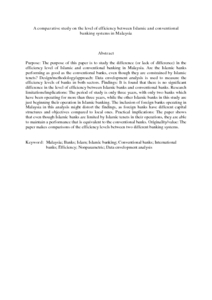Citation
Yahya, Mohamed Hisham and Muhammad, Junaina and Abdul Hadi, Abdul Razak
(2012)
A comparative study on the level of efficiency between Islamic and conventional banking systems in Malaysia.
International Journal of Islamic and Middle Eastern Finance and Management, 5 (1).
pp. 48-62.
ISSN 1753-8394; ESSN: 1753-8408
Abstract
Purpose: The purpose of this paper is to study the difference (or lack of difference) in the efficiency level of Islamic and conventional banking in Malaysia. Are the Islamic banks performing as good as the conventional banks, even though they are constrained by Islamic tenets? Design/methodology/approach: Data envelopment analysis is used to measure the efficiency levels of banks in both sectors. Findings: It is found that there is no significant difference in the level of efficiency between Islamic banks and conventional banks. Research limitations/implications: The period of study is only three years, with only two banks which have been operating for more than three years, while the other Islamic banks in this study are just beginning their operation in Islamic banking. The inclusion of foreign banks operating in Malaysia in this analysis might distort the findings, as foreign banks have different capital structures and objectives compared to local ones. Practical implications: The paper shows that even though Islamic banks are limited by Islamic tenets in their operations, they are able to maintain a performance that is equivalent to the conventional banks. Originality/value: The paper makes comparisons of the efficiency levels between two different banking systems.
Download File
![[img]](http://psasir.upm.edu.my/22858/1.hassmallThumbnailVersion/A%20comparative%20study%20on%20the%20level%20of%20efficiency%20between%20Islamic%20and%20conventional%20banking%20systems%20in%20Malaysia.pdf)  Preview |
|
PDF (Abstract)
A comparative study on the level of efficiency between Islamic and conventional banking systems in Malaysia.pdf
Download (83kB)
| Preview
|
|
Additional Metadata
Actions (login required)
 |
View Item |

